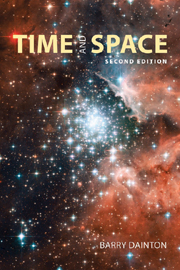Book contents
- Frontmatter
- Contents
- Preface to the second edition
- Preface to the first edition
- 1 Preliminaries
- 2 McTaggart on time's unreality
- 3 The Block universe
- 4 Asymmetries within time
- 5 Tensed time
- 6 Dynamic time
- 7 Time and consciousness
- 8 Time travel
- 9 Conceptions of void
- 10 Space: the classical debate
- 11 Absolute motion
- 12 Motion in spacetime
- 13 Curved space
- 14 Tangible space
- 15 Spatial anti-realism
- 16 Zeno and the continuum I
- 17 Zeno and the continuum II
- 18 Special relativity
- 19 Relativity and reality
- 20 General relativity
- 21 Spacetime metaphysics
- 22 Strings
- Notes
- Glossary
- Web resources
- Bibliography
- Index
Preface to the first edition
- Frontmatter
- Contents
- Preface to the second edition
- Preface to the first edition
- 1 Preliminaries
- 2 McTaggart on time's unreality
- 3 The Block universe
- 4 Asymmetries within time
- 5 Tensed time
- 6 Dynamic time
- 7 Time and consciousness
- 8 Time travel
- 9 Conceptions of void
- 10 Space: the classical debate
- 11 Absolute motion
- 12 Motion in spacetime
- 13 Curved space
- 14 Tangible space
- 15 Spatial anti-realism
- 16 Zeno and the continuum I
- 17 Zeno and the continuum II
- 18 Special relativity
- 19 Relativity and reality
- 20 General relativity
- 21 Spacetime metaphysics
- 22 Strings
- Notes
- Glossary
- Web resources
- Bibliography
- Index
Summary
Is space an ingredient of reality in its own right, or simply nothingness? What does the passage of time amount to? Is only the present real, or is the past real as well? And what of the future? Are space and time finite or infinite? For anyone with an interest in the large-scale composition of the cosmos, no questions are more pressing than these; likewise for those concerned to understand the framework within which we live our lives. But few questions are more challenging. Trying to think clearly about space is not easy. How does one go about thinking about nothing? But time is harder still. While it may seem clear that the past is real in a way the future is not, it also seems clear that the present is real in a way the past is not, so what sort of reality does the past possess? It may seem obvious that time passes, that the present is steadily advancing into the future, but just what does the passage of time involve? These are simple questions about the most fundamental features of our world, yet no obvious answers spring to mind.
Answers to all these questions have been proposed; many of them are fascinating, and many far from obvious. The philosophical literature, both ancient and modern, is both large and wide-ranging, embracing as it does topics as diverse as semantics, causation, modality and phenomenology.
- Type
- Chapter
- Information
- Time and Space , pp. xiii - xviPublisher: Acumen PublishingPrint publication year: 2010



